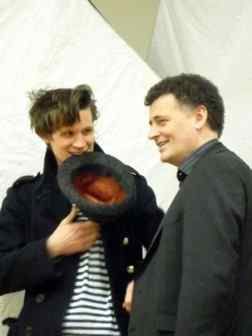
If you’re wanting an endorsement for tonight’s season premiere of “Doctor Who,” there’s always this from Matt Smith, who currently plays the time traveling doctor, who returns tonight with the wish to kill the Fuhrer.
“ ‘Let’s Kill Hitler’ is maybe my favorite episode to date. It just rockets along,” Matt Smith declared at the TV Critics press tour in Beverly Hills last month. “It doesn’t disappoint.”
He credits writer Steven Moffat, who has given the longrunning series a zing in recent years with some of the series’ most imaginative scripts.
When the words “Let’s kill Hitler” were uttered by Dr. Who at the end of the last season, some may have wondered if it was proper for the sci-fi series to take the World War II villain so lightly.
To that, Moffat said: “I think we can unequivocally and controversially say that we were against Hitler. I think he was a bad thing, and I’m glad he’s gone.
“Really, I think the worst thing you could possibly do to that awful, awful man is to take the mickey out of him on ‘Doctor Who,’” Moffat says. “So that’s what we do. Don’t worry. We’re not really going to save Hitler. He is, by the way, dead already. So we can’t.”
Moffat’s scripts have shaken Britain and the world of “Doctor Who” fans, by reinventing the rules and even nearly killing him off.
“We just started off on a different foot, and it kind of shocked people. It excited them,” he says. “The trouble with a series as it gets older is it can feel like a tradition, and tradition is the enemy of suspense, and it’s the enemy of comedy. It’s the enemy of everything really. So you have to shake it up.
“That doesn’t mean it’s the new tradition,” he says. “We’ll shake it up in a completely different way next time. But that’s what it’s about, keeping it lively, keeping it brand new, keeping it exciting.”
And there’s no fear of ever running out of story, Moffat says. “There’s always something else to tell. There’s always some other part of the story.”
But no episode can be a destination, he says. “Everything has to be a waystation, a different ‘you’re going off somewhere else.’
“You have a reveal about whoever it is, and that just makes the story more complicated. You think: ‘Oh, we’ll find out who she is, and that will be over.’
“No, it’s not. You know that little girl the Doctor first met when she was seven and who, when she was a little bit older, snogged him against the tardis, turns out to be the mother, possibly, of the woman he’s possibly married to in the future. How terrifying. That’s not going to make your life simpler.
“Every revelation has to be story. You can’t just tie off the narrative. It’s got to send it off in a new way, and each time you think you know the truth about River, you don’t know it yet, and there’s loads more to come. Each reveal makes you go, ‘Oh, right. So that means, that means, that means.’ That’s what story is, I think.”
And for those who don’t have all that foreknowledge of “Doctor Who,” Moffat swears it isn’t all that hard to get involved in the series fresh.
“Even if it’s complicated, even if there’s a lot of stuff going on, there will be some running and an explosion and some great gags and some pretty people,” he says. “You’ll enjoy it. You know, it’s always entertaining by every means possible.”
He offers an example of his own viewing: “I used to love, absolutely love, the American show ‘West Wing.’ I never had a clue of what was going on in it because I didn’t understand anything about American politics. They all seemed to understand it, and that was fine by me.
“They’d walk very fast down long corridors and say really weak stuff and say, ‘We’ve got to do this with Congress and a thing.’ And I’d say, ‘What’s a Congress?’ ‘Never mind. It’s important.’ Then they’d say, ‘We’ve done it. We’ve got an affidavit,’ or something. I’d say, ‘Aha,’ so relieved, ‘I wonder what happens next week. I wonder what happened this week.’
That, I think, is the way ‘Doctor Who’ can work for anyone: Because it’s fun. If you don’t understand all of it, join the rest of the audience.”
His responsibility is to keep the entertainment value high. And he says, “the only way you can keep your show alive and keep it vibrant is to make changes. Stories are about changes.”
If anyone insisted “Doctor Who” could only be made a certain way, Moffat says, “you might as well build that tomb.
“If you look at the way ‘Doctor Who’ has progressed, it’s been scandalously neglectful of the future in a way,” Moffat says. “Suddenly they give him a whole new backstory. He wasn’t originally a Time Lord. He suddenly is a Time Lord. Then, like they say, you can regenerate out of nowhere and change the actor. Suddenly we kill off all the rest of the time lords.”
But that’s how things go, he says. “It’s a story. Things happen in stories. You can’t just stop them and freeze them.”
That puts it at odd with that other giant of British fiction, James Bond, “which I love, but is nonetheless basically doing the same story over and over again. ‘Doctor Who’ does a bit of that, but is does allow progress and change, and that means you’ve got to watch next week because next week might be the one where everything changes, and it is, oddly enough.”
Hence, he concludes: “You cannot miss “Let’s Kill Hitler.”
“Let’s Kill Hitler” opens the set of new episodes on “Doctor Who” on BBC America tonight at 9 p.m.